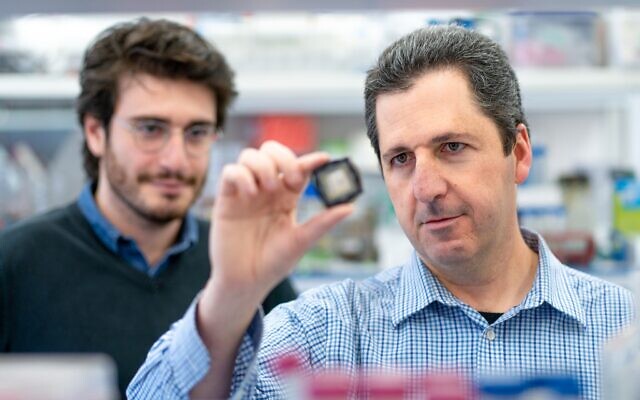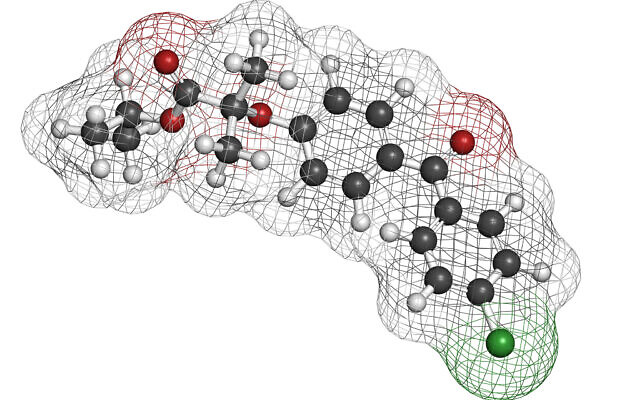Existing drug may downgrade COVID threat to common cold level — Jerusalem study
Hebrew University professor says he’s worked out what makes the raging virus so vicious, and how to fix it using an anti-cholesterol med; no human testing done yet
An existing medicine can “downgrade” the danger-level of
coronavirus to that of a common cold, a Jerusalem researcher is
claiming, after testing it on infected human tissue.
Prof. Yaakov Nahmias says that his research shows that the novel coronavirus is so vicious because it causes lipids to be deposited in the lungs, and that there is a solution to undo the damage: a widely-used anti cholesterol drug called fenofibrate.
“If our findings are borne out by clinical studies, this course of treatment could potentially downgrade COVID-19’s severity into nothing worse than a common cold,” Nahmias said.
Unlike remdesivir, which is being lauded for its effect on coronavirus patients, fenofibrate, sometimes sold under the brand name Tricor, is already accredited by America’s Food and Drug Administration and is in plentiful supply. Remdesivir is in short supply and is also still pending full approval by regulators like the FDA.

Nahmias, director of Hebrew University’s Grass Center for
Bioengineering, reached his conclusion in joint research with Dr.
Benjamin tenOever at New York’s Mount Sinai Medical Center. Their paper
has gone live on an online portal run by Cell Press, publishers of biomedical journals, for research that hasn’t yet been peer reviewed.

Similar processes, hinging on the virus depositing fats, seem to take
place in other parts of the body too, such as the liver, said Nahmias.
He believes that the virus does this in order to perpetuate itself in the host, and that if this process can be stopped, it will halt the onset of problems with organs — normally the lungs — that cause the virus to badly affect patients.He said the virus interferes with the ability of the body to break down fat, and fenofibrate jump-starts this process. “The interesting thing about our study is that fenofibrate actually binds and activates the very site on the DNA that the virus shuts down — a part of our DNA that allows our cells to burn fat,” he stated.
Prof. Yaakov Nahmias says that his research shows that the novel coronavirus is so vicious because it causes lipids to be deposited in the lungs, and that there is a solution to undo the damage: a widely-used anti cholesterol drug called fenofibrate.
“If our findings are borne out by clinical studies, this course of treatment could potentially downgrade COVID-19’s severity into nothing worse than a common cold,” Nahmias said.
Unlike remdesivir, which is being lauded for its effect on coronavirus patients, fenofibrate, sometimes sold under the brand name Tricor, is already accredited by America’s Food and Drug Administration and is in plentiful supply. Remdesivir is in short supply and is also still pending full approval by regulators like the FDA.

Prof. Yaakov Nahmias of the Hebrew University of Jerusalem (right) (courtesy of the Hebrew University of Jerusalem)
Nahmias and tenOever performed lab tests on human lung cells infected with SARS-CoV-2.
Nahmias said they arrived at the idea
that a cholesterol drug could help after studying the way in which the
novel coronavirus “hijacks” the human body.
He told The Times of Israel: “The
question is why this new coronavirus is so different from its close
relatives that just cause a common cold. What we see is that this virus
really changes lipid metabolism in the human lungs. The new coronavirus
causes tiny lipid droplets to accumulate in the lungs, something you
don’t normally see in the lungs in any significant quantity.”

The chemical composition of the
fenofibrate cholesterol-lowering drug. Atoms are represented as spheres
with conventional color coding: hydrogen (white), carbon (grey), oxygen
(red), chlorine (green) (iStock)
He believes that the virus does this in order to perpetuate itself in the host, and that if this process can be stopped, it will halt the onset of problems with organs — normally the lungs — that cause the virus to badly affect patients.He said the virus interferes with the ability of the body to break down fat, and fenofibrate jump-starts this process. “The interesting thing about our study is that fenofibrate actually binds and activates the very site on the DNA that the virus shuts down — a part of our DNA that allows our cells to burn fat,” he stated.
“Virus infection causes the lung cells to start building up fat, and fenofibrate allows the cells to burn it.”
The restart of the process is swift, he said, comparing it to “when the plug is removed from the bath tub.”
Nahmias said that the high danger level from
coronavirus isn’t caused by its infectiousness or the body’s general
ability to rid itself of the virus, but rather by the unique symptoms it
causes. “Your body can easily deal with the virus, all we need to do is
deal with the symptoms,” he said.
“We need to give the body time to clear the
virus without going into respiratory failure. And it’s by doing this
that I think we can transform it into something far less serious,
something like the common cold.”
7 more rows
Fenofibrate (brand names: Antara, Fenoglide, Lipofen, Lofibra, TriCor, Triglide) is a fibrate drug used to treat high cholesterol and high triglyceride (fatty acid) levels. Fenofibrate is a generic drug.
Side Effects of Fenofibrate 40 mg/ 120 mg (Fenofibrate ...
Brand Name
| Brand Name | Composition | Company |
|---|---|---|
| fenolip 145 tab | Fenofibrate (nanotablet formulation) 145mg | cipla |
| finate cap | Fenofibrate 160mg | franco indian |
| finate cap | Fenofibrate 200mg | franco indian |
| lipicard cap | Fenofibrate 160mg | usv |
